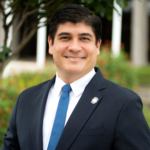For decades, we have known that conserving global forests, particularly tropical ones, is crucial to slowing and potentially reversing the build-up of carbon dioxide and other greenhouse gases driving rapid and destructive climate and weather changes. Forests are also vital to maintaining biodiversity, ensuring water security, and supporting food systems. Yet, deforestation continues, and efforts to slow or reverse it, even when successful, have lacked the scale necessary to meet the challenge.
The difficulty in tackling this issue is clear: the short-term economic benefits of activities causing deforestation have been important to the countries and communities hosting tropical forests, while the global community that could benefit from halting these activities has not offered adequate compensation to those nations and communities.
“Protecting tropical forests is one of the defining challenges of our era—not only a climate imperative but a test of global governance. It requires bold political leadership, long-term vision, and a renewed commitment to international solidarity. The Tropical Forests Finance Facility (TFFF) offers a transformative approach—innovative, ambitious, and rooted in shared responsibilities and mutual benefits. Club de Madrid strongly supports this initiative as it reflects a much-needed evolution: from traditional development assistance to a model of genuine development cooperation, where all actors—public and private, local and global—work together as partners.”
— María Elena Agüero, Secretary General, Club de Madrid
Against this backdrop, tropical forest nations, developed countries, the World Bank, and civil society have put forward an innovative and cost-effective proposal—the Tropical Forests Forever Facility (TFFF)—which has the potential to provide large-scale financial incentives for tropical forest conservation while avoiding the complexity of previous efforts.
The TFFF proposal is straightforward: sovereign sponsors would provide long term loans or guarantees that would raise funds in the liquid, investment-grade debt capital markets. These funds would then be invested in a diversified portfolio primarily composed of emerging-market debt, generating returns several percentage points higher than the cost of the debt supporting the portfolio. The excess returns would be used to reward tropical forest nations that successfully protect or restore their forests, through fixed payments per hectare of forest cover reported by these countries.
Importantly, TFFF would not require (though it would accept if offered) grants from sponsoring sovereigns and would pay them interest on their loans or fees for their guarantees at their respective sovereign borrowing costs. Loans would also be fully repaid. Financial modelling has shown that the risk of non-repayment or calls on guarantees is extremely low. Put simply, a sovereign investment in TFFF is “balance-sheet neutral”—sponsoring nations would hold an asset on their books that offsets any borrowing they may have done to fund their TFFF investment.
“Humanity—and the planet we call home—depends on tropical forests, not only for our present well-being but for the future of life on Earth. The TFFF is an innovative mechanism designed to protect these vital ecosystems, empower Indigenous communities, and recognize their central role in this global effort. It brings together collaboration at an unprecedented scale and scope. This could well become one of the most significant—if not the defining—outcomes of COP30 in Brazil.”
— Carlos Alvarado Quesada, Club de Madrid Member
Brazil and its partners are proposing a facility that, over time, would grow to USD 125 billion in assets, with USD 25 billion coming from sovereign loans and/or guarantees, and USD 100 billion from global debt markets. This would enable TFFF to offer, on average, USD 4 per hectare per annum for successfully protected forests across the approximately 1.2 billion hectares of tropical forest worldwide. For comparison, the TFFF approach would offer roughly 16 times the CO2 mitigation value of a similarly sized investment in a green bond financing renewable energy.
The development of the TFFF proposal is well-advanced. After the initial concept was discussed at President Macron’s Summit on a New Global Financing Pact, Brazil introduced it at COP 28 in Dubai and is leading continued efforts, with a view to launching it at COP 30 in Belém. The proposed finances, verification methodology, and governance structure are based on widely accepted best practices and are being refined through a collaborative process involving 12 countries (6 tropical countries and 6 potential investor countries).
The urgency of addressing the protection of global forest resources makes the success of the TFFF initiative essential. Club de Madrid is fully supportive of this innovative blended finance model and urges all to join us in backing this critical effort.


